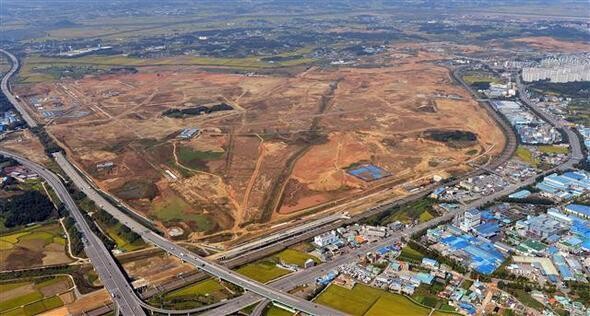hankyoreh
Links to other country sites 다른 나라 사이트 링크
Samsung to build world’s largest semiconductor plant

By Lee Jung-ae, staff reporter
Samsung Electronics is gearing up to build the world’s largest high-tech semiconductor plant in Pyeongtaek, Gyeonggi Province.
The company announced on Oct. 6 that it had decided to invest 15.6 trillion won (US$14.63 billion) in the first stage of the construction of a state-of-the-art semiconductor assembly line in the Godeok Industrial Complex in Pyeongtaek.
This is the most money ever invested in a facility dedicated to semiconductors. It is more than double the previous record, 7.3 trillion won, which Samsung Electronics spent on a test semiconductor factory in Shanxi Province, China.
The plot of land at the Godeok industrial complex owned by Samsung Electronics is 2.83 million ㎡ in area. For now, the company is planning to use 790,000 ㎡ of this to build the infrastructure and the semiconductor facility. Construction is scheduled to begin in the first half of 2015 and conclude in the second of 2017, when production should start at the factory. The company is planning to monitor the market situation and decide whether to invest more money in its lot at the complex.
“When the new factory begins operations, it will create both directly and indirectly a total of 150,000 jobs and produce 40 trillion won in added value in the manufacturing process,” said Kim Ki-nam, head of the Samsung Electronics’ System LSI Division and the person in charge of semiconductors for the company.
Samsung Electronics’ bold decision to make such a huge investment is an attempt to compensate for its falling profits in the smartphone industry by increasing the competitiveness of its semiconductor business. The company‘s smartphone business has fueled its rising profits for the past few years, but smartphone profitability is steadily declining because of slowing growth and intensifying competition.
But with recent reorganization in the semiconductor market creating an oligopoly, it has become possible to adjust supply. In addition, there is growing demand for smartphones, tablets, and other mobile devices, and there are more applications for semiconductors in the internet of things and robotics, which is why Samsung Electronics has been boosting its investment in the semiconductor sector recently.
Please direct questions or comments to [english@hani.co.kr]

Editorial・opinion
![[Column] Has Korea, too, crossed the Rubicon on China? [Column] Has Korea, too, crossed the Rubicon on China?](https://flexible.img.hani.co.kr/flexible/normal/500/300/imgdb/original/2024/0419/9317135153409185.jpg) [Column] Has Korea, too, crossed the Rubicon on China?
[Column] Has Korea, too, crossed the Rubicon on China?![[Correspondent’s column] In Japan’s alliance with US, echoes of its past alliances with UK [Correspondent’s column] In Japan’s alliance with US, echoes of its past alliances with UK](https://flexible.img.hani.co.kr/flexible/normal/500/300/imgdb/original/2024/0419/2317135166563519.jpg) [Correspondent’s column] In Japan’s alliance with US, echoes of its past alliances with UK
[Correspondent’s column] In Japan’s alliance with US, echoes of its past alliances with UK- [Editorial] Does Yoon think the Korean public is wrong?
- [Editorial] As it bolsters its alliance with US, Japan must be accountable for past
- [Guest essay] Amending the Constitution is Yoon’s key to leaving office in public’s good graces
- [Editorial] 10 years on, lessons of Sewol tragedy must never be forgotten
- [Column] A death blow to Korea’s prosecutor politics
- [Correspondent’s column] The US and the end of Japanese pacifism
- [Guest essay] How Korea turned its trainee doctors into monsters
- [Guest essay] As someone who helped forge Seoul-Moscow ties, their status today troubles me
Most viewed articles
- 1[Column] The clock is ticking for Korea’s first lady
- 2Hong Se-hwa, voice for tolerance whose memoir of exile touched a chord, dies at 76
- 3After 2 months of delayed, denied medical care, Koreans worry worst may be yet to come
- 4[Column] Has Korea, too, crossed the Rubicon on China?
- 5Samsung barricades office as unionized workers strike for better conditions
- 6US overtakes China as Korea’s top export market, prompting trade sanction jitters
- 7All eyes on Xiaomi after it pulls off EV that Apple couldn’t
- 8[Guest essay] How Korea turned its trainee doctors into monsters
- 9[Editorial] As it bolsters its alliance with US, Japan must be accountable for past
- 10[Correspondent’s column] In Japan’s alliance with US, echoes of its past alliances with UK